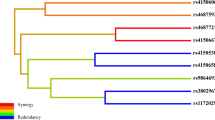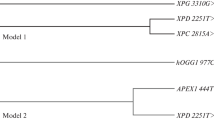Abstract
Polymorphisms in DNA repair and apoptosis genes are suspected to alter the individual susceptibility to develop lung cancer. We investigated the relationship between polymorphisms in ATM (A60G), ERCC1 (Asn118Asn), APE1 (Asn148Glu) and iASPP (A67T) and the risk of developing lung cancer. A case–control study was conducted with 315 patients with lung cancer and 315 cancer-free controls, matched on age and sex. Genotypes were detected using the ABI 7500 real-time PCR system. The T/T homozygote in ERCC1 (Asn118Asn) was correlated with a strong statistically significant increased risk of developing lung cancer (adjusted OR = 2.44; 95% CI = 1.13–5.28; P = 0.023), especially lung adenocarcinoma (adjusted OR = 3.18) and small cell lung cancer (adjusted OR = 6.08). For iASPP (A67T), smokers with at least one T allele (A/T + T/T) were more likely to develop lung cancer (95% CI, 1.07–2.84, P = 0.026). Subjects carrying the G allele in APE1 (Asn148Glu) had a decreased risk of lung cancer (P < 0.05), which showing a protective effect. Our results suggest that polymorphism Asn118Asn in ERCC1, A67T in iASPP and Asn148Glu in APE1 may associated with early onset of lung cancer as well as some specific subtype of lung cancer. Detection of these biomarkers may be helpful for screening this high-risk population for primary preventing.
Similar content being viewed by others
References
Fernández-Rubio A, López-Cima MF, González-Arriaga P, García-Castro L, Pascual T, et al. The TP53 Arg72Pro polymorphism and lung cancer risk in a population of Northern Spain. Lung Cancer. 2008;61:309–16.
Samet JM, Avila-Tang E, Boffetta P, Hannan LM, Olivo-Marston S, et al. Lung cancer in never smokers: clinical epidemiology and environmental risk factors. Clin Cancer Res. 2009;15:5626–45.
Benhamou S, Sarasin A. ERCC2/XPD gene polymorphisms and lung cancer: a HuGE review. Am J Epidemiol. 2005;161:1–14.
Spitz MR, Wu X, Wang Y, Wang LE, Shete S, et al. Modulation of nucleotide excision repair capacity by XPD polymorphisms in lung cancer patients. Cancer Res. 2001;61:1354–7.
Abraham RT. PI 3-kinase related kinases: ‘big’ players in stress-induced signaling pathways. DNA Repair (Amst). 2004;3:883–7.
Angèle S, Romestaing P, Moullan N, Vuillaume M, Chapot B, et al. ATM haplotypes and cellular response to DNA damage: association with breast cancer risk and clinical radiosensitivity. Cancer Res. 2003;63:8717–25.
Zuur CL, Simis YJ, Lansdaal PE, Hart AA, Rasch CR, et al. Risk factors of ototoxicity after cisplatin-based chemo-irradiation in patients with locally advanced head-and-neck cancer: a multivariate analysis. Int J Radiat Oncol Biol Phys. 2007;68:1320–5.
Hickson I, Zhao Y, Richardson CJ, Green SJ, Martin NM, et al. Identification and characterization of a novel and specific inhibitor of the ataxia-telangiectasia mutated kinase ATM. Cancer Res. 2004;64:9152–9.
Rainey MD, Charlton ME, Stanton RV, Kastan MB. Transient inhibition of ATM kinase is sufficient to enhance cellular sensitivity to ionizing radiation. Cancer Res. 2008;68:7466–74.
Lord RV, Brabender J, Gandara D, Alberola V, Camps C, et al. Low ERCC1 expression correlates with prolonged survival after cisplatin plus gemcitabine chemotherapy in non-small cell lung cancer. Clin Cancer Res. 2002;8:2286–91.
Ceppi P, Volante M, Novello S, Rapa I, Danenberg KD, et al. ERCC1 and RRM1 gene expressions but not EGFR are predictive of shorter survival in advanced non-small-cell lung cancer treated with cisplatin and gemcitabine. Ann Oncol. 2006;17:1818–25.
Lu J, Zhang S, Chen D, Wang H, Wu W, et al. Functional characterization of a promoter polymorphism in APE1/Ref-1 that contributes to reduced lung cancer susceptibility. FASEB J. 2009;23:3459–69.
Su D, Ma S, Liu P, Jiang Z, Lv W, et al. Genetic polymorphisms and treatment response in advanced non-small cell lung cancer. Lung Cancer. 2007;56:281–8.
Zienolddiny S, Campa D, Lind H, Ryberg D, Skaug V, et al. Polymorphisms of DNA repair genes and risk of non-small cell lung cancer. Carcinogenesis. 2006;27:560–7.
Jo H, Kang S, Kim SI, Kim JW, Park NH, et al. The C19007T polymorphism of ERCC1 and its correlation with the risk of epithelial ovarian and endometrial cancer in Korean women. A case control study. Gynecol Obstet Invest. 2007;64:84–8.
Vogel U, Laros I, Jacobsen NR, Thomsen BL, Bak H, et al. Two regions in chromosome 19q13.2–3 are associated with risk of lung cancer. Mutat Res. 2004;546:65–74.
Zhou W, Liu G, Park S, Wang Z, Wain JC, et al. Gene-smoking interaction associations for the ERCC1 polymorphisms in the risk of lung cancer. Cancer Epidemiol Biomarkers Prev. 2005;14(2):491–6.
Kiyohara C, Yoshimasu K. Genetic polymorphisms in the nucleotide excision repair pathway and lung cancer risk: a meta-analysis. Int J Med Sci. 2007;4:59–71.
Soukupova J, Dundr P, Kleibl Z, Pohlreich P. Contribution of mutations in ATM to breast cancer development in the Czech population. Oncol Rep. 2008;19:1505–10.
Meyer A, Wilhelm B, Dörk T, Bremer M, Baumann R, et al. ATM missense variant P1054R predisposes to prostate cancer. Radiother Oncol. 2007;83:283–8.
Einarsdóttir K, Humphreys K, Bonnard C, Li Y, Li Y, et al. Effect of ATM, CHEK2 and ERBB2 TAGSNPs and haplotypes on endometrial cancer risk. Hum Mol Genet. 2007;16:154–64.
Yang H, Spitz MR, Stewart DJ, Lu C, Gorlov IP, et al. ATM sequence variants associate with susceptibility to non-small cell lung cancer. Int J Cancer. 2007;121:2254–9.
Hadi MZ, Coleman MA, Fidelis K, Mohrenweiser HW, Wilson DM 3rd. Functional characterization of Ape1 variants identified in the human population. Nucleic Acids Res. 2000;28:3871–9.
Lo YL, Jou YS, Hsiao CF, Chang GC, Tsai YH, et al. A polymorphism in the APE1 gene promoter is associated with lung cancer risk. Cancer Epidemiol Biomarkers Prev. 2009;18:223–9.
Shen M, Berndt SI, Rothman N, Mumford JL, He X, et al. Polymorphisms in the DNA base excision repair genes APEX1 and XRCC1 and lung cancer risk in Xuan Wei, China. Anticancer Res. 2005;25:537–42.
Vogel U, Olsen A, Wallin H, Overvad K, Tjønneland A, et al. Effect of polymorphisms in XPD, RAI, ASE-1 and ERCC1 on the risk of basal cell carcinoma among Caucasians after age 50. Cancer Detect Prev. 2005;29:209–14.
Laska MJ, Nexø BA, Vistisen K, Poulsen HE, Loft S, et al. Polymorphisms in RAI and in genes of nucleotide and base excision repair are not associated with risk of testicular cancer. Cancer Lett. 2005;225:245–51.
Funding
The above study is funded by Zhejiang Provincial Natural Science Foundation Y205317.
Conflict of interest
None declared.
Author information
Authors and Affiliations
Corresponding author
Rights and permissions
About this article
Cite this article
Deng, Q., Sheng, L., Su, D. et al. Genetic polymorphisms in ATM, ERCC1, APE1 and iASPP genes and lung cancer risk in a population of southeast China. Med Oncol 28, 667–672 (2011). https://doi.org/10.1007/s12032-010-9507-2
Received:
Accepted:
Published:
Issue Date:
DOI: https://doi.org/10.1007/s12032-010-9507-2




